
Revista de Filologia Alemana
Scope & Guideline
Bridging Linguistic Theory and Literary Analysis
Introduction
Aims and Scopes
- Interdisciplinary Approaches to Literature:
The journal emphasizes the intersection of literature with other fields such as sociology, philosophy, and cultural studies, encouraging explorations that connect literary texts to broader cultural and historical contexts. - Sociolinguistic Perspectives:
A consistent focus on sociolinguistics is evident, with studies addressing language variation, linguistic identity, and the sociocultural dynamics of German dialects, such as Low German. - Historical and Cultural Analysis:
Research often dives into historical narratives and cultural phenomena, examining how these elements shape contemporary German literature and its reception. - Exploration of Literary Genres and Movements:
The journal showcases articles that analyze various literary genres and movements, providing critical insights into German Expressionism, Modernity, and other significant literary trends. - Multilingualism and Translation Studies:
With a growing interest in multilingual authors and translation practices, the journal highlights the complexities of language use in literature, promoting studies that navigate through bilingual and multilingual contexts.
Trending and Emerging
- Cultural Memory and Trauma:
Recent publications increasingly examine themes of memory and trauma in literature, reflecting a societal focus on historical experiences and their representation in contemporary narratives. - Literature in the Context of Current Events:
There is a growing trend towards analyzing literature in the context of recent global events, such as the pandemic, indicating a shift towards the relevance of literature as a response to contemporary crises. - Gender Studies and Feminist Perspectives:
The journal has seen an uptick in articles exploring gender dynamics, stereotypes, and feminist readings of literary texts, showcasing a heightened awareness of gender issues in literature. - Environmental Literature and Ecocriticism:
Emerging themes of environmental concerns and ecocritical perspectives are becoming more prominent, indicating an awareness of ecological crises and their representation in German literature. - Intersections of Language and Identity:
Research focusing on the intersection of language, identity, and migration is increasingly important, reflecting the multicultural fabric of contemporary German-speaking societies.
Declining or Waning
- Traditional Historical Literary Criticism:
As the journal embraces more interdisciplinary and contemporary approaches, traditional historical literary criticism seems to be less frequently addressed, indicating a shift towards modern analytical frameworks. - Focus on Classical Literature:
There is a noticeable decline in studies centered solely on classical literature, suggesting a movement away from canonical texts in favor of examining contemporary works and their relevance in today's cultural discourse. - Exclusively National Narratives:
Papers that focus solely on national narratives without considering transnational influences or multicultural perspectives appear to be diminishing, reflecting a broader trend towards globalization in literary studies.
Similar Journals
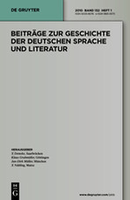
BEITRAGE ZUR GESCHICHTE DER DEUTSCHEN SPRACHE UND LITERATUR
Advancing Scholarly Discourse in Germanic StudiesBEITRAGE ZUR GESCHICHTE DER DEUTSCHEN SPRACHE UND LITERATUR is a distinguished scholarly journal published by Walter de Gruyter GmbH, focusing on the historical development of the German language and literature. With an ISSN of 0005-8076 and an E-ISSN of 1865-9373, this journal has been a pivotal resource for linguistic and literary scholars since its inception in 1874. Hailing from Germany, it serves as a critical platform for understanding the nuanced evolution of Germanic studies, contributing to its categorization in the Q4 and Q3 quartiles in Linguistics and Language and Literature and Literary Theory, respectively, as of 2023. Although not open access, the journal provides invaluable peer-reviewed content that fosters scholarly dialogue and research in its specialized fields, making it an essential read for researchers, professionals, and students dedicated to the richness of German linguistic heritage and literary analysis. The journal's extensive history and commitment to academic excellence position it as a key player in the ongoing discourse within the humanities.

SPRACHWISSENSCHAFT
Pioneering New Horizons in Language StudiesSPRNACHWISSENSCHAFT is a prominent academic journal dedicated to the field of linguistics and language studies, published by Universitätsverlag C Winter Heidelberg GmbH. With an ISSN of 0344-8169 and an E-ISSN of 2567-6563, this journal serves as a critical platform for researchers and scholars to explore innovative research developments and theoretical frameworks in linguistics. Although the journal's coverage in databases has been discontinued from 2021, it continues to hold significance in the academic community, reflected in its 2023 Q3 ranking in both the Linguistics and Language category, placing it at the 41st percentile in Arts and Humanities. Exploring various dimensions of language and communication, SPRNACHWISSENSCHAFT aims to contribute to ongoing conversations within the discipline, making it an essential resource for academics interested in the evolving landscape of linguistic research.

ZEITSCHRIFT FUR DEUTSCHE PHILOLOGIE
Fostering Academic Exchange in the HumanitiesZEITSCHRIFT FUR DEUTSCHE PHILOLOGIE is a prestigious academic journal dedicated to the exploration of German philology, literature, and linguistic theory, published by Erich Schmidt Verlag. With a commitment to advancing scholarship in the field, it showcases a diverse range of research articles, critical essays, and theoretical explorations that contribute to the understanding of German language and its literary heritage. While the journal has experienced fluctuating coverage in indexing databases such as Scopus, it remains a valuable resource for researchers and students alike, offering insights into relevant academic discourse. Despite not being openly accessible, the journal continues to serve as an important platform for academic exchange and innovation, allowing scholars to engage with the complexities of language and literature. Its rigorous peer-review process ensures that only high-quality research is published, making it essential reading for anyone invested in the humanities.

LINGUA E STILE
Advancing Scholarly Discourse in Linguistics and LiteratureLINGUA E STILE, published by SOC ED IL MULINO, is a distinguished academic journal based in Italy that delves into the intricate realms of linguistics, literature, and philosophy. With an ISSN of 0024-385X, this journal has been a vital platform for scholarly discourse since its inception, covering a broad spectrum of topics from linguistic theory to literary analysis. Although it currently holds a Q4 category ranking in 2023 across multiple disciplines—specifically in Linguistics and Language, Literature and Literary Theory, and Philosophy—it remains committed to fostering insightful contributions that challenge and expand conventional understanding in these fields. While it does not offer open access, the journal diligently focuses on publishing high-quality research that appeals to academics, professionals, and students alike. With the convergence of multi-disciplinary approaches, LINGUA E STILE is positioned to engage with contemporary debates and developments, enriching the academic landscape from its base in Bologna, Italy, and inviting contributions that exemplify the evolving intersections of language and thought.

DEUTSCHE SPRACHE
Fostering a Passion for the German Language and Its StudiesDEUTSCHE SPRACHE, published by Erich Schmidt Verlag, is a pivotal journal dedicated to the intricate study of the German language. With its ISSN 0340-9341 and E-ISSN 1866-5233, this publication serves as a vital resource for linguists, educators, and language enthusiasts alike. Spanning diverse topics within the fields of linguistics and language, psychology, and social sciences, the journal has earned a Q3 ranking in Linguistics and Language, alongside a Q4 ranking in both Psychology (miscellaneous) and Social Sciences (miscellaneous) as of 2023. Although the journal is not Open Access, it provides invaluable insights on the developments in German language research from its convergence years of 2002 to 2011 and 2017 to 2023. Positioned in Berlin-Tiergarten, Germany, DEUTSCHE SPRACHE continues to expand its influence and accessibility to researchers, professionals, and students keen on understanding the nuances of linguistic expression in the German language.
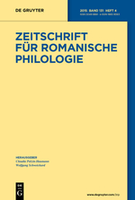
ZEITSCHRIFT FUR ROMANISCHE PHILOLOGIE
Unveiling the Heritage of Romance Languages Since 1877ZEITSCHRIFT FUR ROMANISCHE PHILOLOGIE, published by Walter de Gruyter GmbH, stands as a prominent peer-reviewed journal dedicated to the fields of Linguistics, Literature, and Literary Theory. Established in 1877 and continuing its legacy to the present day, this esteemed journal offers a platform for comprehensive scholarship that explores the intricacies of Romance languages and their literary heritage. With a notable Q1 ranking in Literature and Literary Theory and a Q2 ranking in Linguistics and Language, it has secured its place among leading resources in the humanities. Researchers, educators, and students benefit from its rich historical context and current contributions to the understanding of Romance languages and literature. Though currently not available as Open Access, the journal prioritizes the dissemination of high-quality research, making significant strides in fostering academic dialogue and advancement. Its address at Genthiner Straße 13, Berlin, Germany, situates it in a hub of scholarly activity, bridging the past with contemporary literary discourse.

Linguistica e Filologia
Empowering Researchers Through Open Access Scholarship.Linguistica e Filologia is a prominent academic journal published by UNIV DEGLI STUDI BERGAMO that offers an Open Access platform since 2002, fostering scholarly communication in the fields of linguistics, philology, and comparative literature. With a commitment to advancing understanding in these disciplines, the journal serves as a vital resource for researchers, professionals, and students alike. Its content encompasses diverse theoretical and empirical studies, critiques, and analyses of language and literature, encouraging interdisciplinary dialogue. Hosted in the picturesque city of Bergamo, Italy, the journal aims to bridge gaps between historical and contemporary linguistic practices, enhancing the global discourse on language studies. With a focus on quality, transparency, and accessibility, Linguistica e Filologia plays a crucial role in shaping the future of linguistic scholarship and is an invaluable reference for anyone interested in the intricate relationships between language and culture.
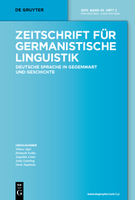
ZEITSCHRIFT FUR GERMANISTISCHE LINGUISTIK
Unveiling Insights in German Linguistic FrameworksZEITSCHRIFT FUR GERMANISTISCHE LINGUISTIK, published by WALTER DE GRUYTER GMBH, stands as a pivotal resource in the field of linguistics since its inception in 1973. With its ISSN 0301-3294 and E-ISSN 1613-0626, this esteemed journal serves as an essential platform for researchers and academics focused on the nuances of the German language and its linguistic frameworks. Catering to a diverse audience, the journal features high-impact articles and contributions consistent with rigorous academic standards, as evident from its Q1 categorization in Linguistics and Language and its notable rankings in both the Arts and Humanities and Social Sciences domains. The journal's commitment to advancing knowledge in linguistics fosters a scholarly environment conducive to both emerging and established linguists. While not available through open access, ZEITSCHRIFT FUR GERMANISTISCHE LINGUISTIK remains influential, drawing readers keen on exploring developmental and educational paradigms alongside linguistic theories. With a convergence of research that spans until 2024, it represents a comprehensive body of work integral to the evolving landscape of linguistic studies in Germany and beyond.
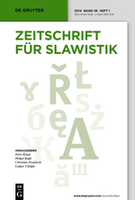
ZEITSCHRIFT FUR SLAWISTIK
Fostering Cross-Disciplinary Dialogue in Slavic ResearchZEITSCHRIFT FUR SLAWISTIK, published by WALTER DE GRUYTER GMBH, is a renowned journal focusing on Slavic studies, encompassing various fields such as cultural studies, linguistics, and literary theory. With its ISSN 0044-3506, this distinguished journal has been a significant contribution to the academic community since its inception in 1956, continuing to disseminate valuable research until 2024. While maintaining a strong reputation within several academic categories, ZEITSCHRIFT FUR SLAWISTIK holds a Q3 ranking in Cultural Studies and Linguistics and Language, and a Q2 ranking in Literature and Literary Theory as of 2023. This positioning underscores the journal’s impact, particularly as it caters to an audience of researchers, professionals, and students invested in the rich tapestry of Slavic culture and language. Access to this journal is not open; however, its comprehensive articles are crucial for anyone aiming to explore and deepen their understanding of Slavic linguistic and literary traditions. The journal's work is essential in fostering cross-disciplinary dialogue and advancing scholarship in these vital areas.
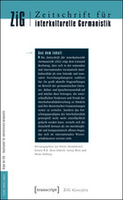
Zeitschrift fur Interkulturelle Germanistik
Advancing Interdisciplinary Perspectives on Language and IdentityZeitschrift für Interkulturelle Germanistik is a leading academic journal specializing in the field of intercultural studies and German linguistics. Published by TRANSCRIPT VERLAG, this journal serves as a platform for innovative research, critical essays, and interdisciplinary discussions that explore the complexities of cultural interactions within the German-speaking world and beyond. With a commitment to fostering scholarly exchange, the journal invites contributions that delve into themes such as language, identity, migration, and cultural dialogue. Although the journal does not currently offer open access, its robust editorial standards are aimed at providing readers with high-quality, peer-reviewed content. Researchers, professionals, and students engaged in German studies will find this journal an invaluable resource for the latest findings and theoretical advancements in intercultural communication and Germanistik. For more information, visit TRANSCRIPT VERLAG's official page.